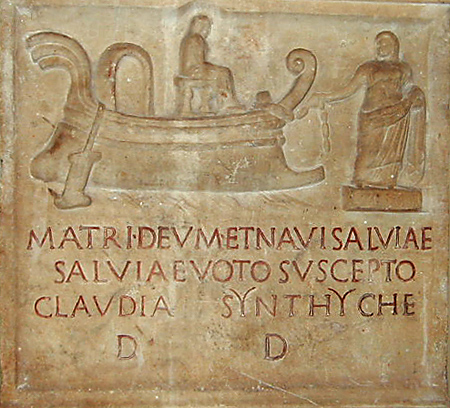
Claudia Quinta draws Cybele's boat to Rome
Marble votive altar, Rome 1st century CE
According to her name, Claudia Quinta was the fifth daughter of a male member of the gens Claudia (see line 33 below), a proud and illustrious but haughty and arrogant family, one of the most powerful and oldest in Rome. Her father, Publius Claudius Pulcher (consul in 249 BCE), was one of the four sons of Appius Claudius Caecus, who featured in Cicero's speech attacking his descendent, Clodia Metelli. She entered the historical record in 204 BCE, when, at a crucial point in the Second Punic War, Rome sought the aid of the gods in driving Hannibal out of Italy. Prompted by a consultation of the Sibylline books, the Romans sent a delegation to King Attalus I of Pergamum to negotiate the transfer of a black aniconic image of the Mother of the Gods, Cybele, from Asia Minor to Rome. After receiving further encouragement from Apollo during a stop at Delphi, the delegation reached its destination and achieved its objective, bringing the cult statue from Pessinus, the site of Cybele’s temple, or from Pergamum to Ostia, the port of Rome. Following the instructions of the Sibylline books, P. Cornelius Scipio Nasica, cousin of the famous P. Cornelius Scipio Africanus, was elected the vir optimus by the Senate in Rome and given the honor of receiving the goddess upon her arrival, together with the city’s matrons. The statue was accompanied by a wild and ecstatic troupe of Cybele's eunuch priests, the Galli. When, in the passage below, the goddess' ship ran aground on a sandbar in Ostia, at the mouth of the Tiber River, Claudia Quinta, whether to demonstrate or vindicate her chastity, stepped forward, took hold of the ship's guide rope and easily freed it (see lines 33-47). The ship followed Claudia up the river to Rome, where Cybele's statue was temporarily installed on the Palatine Hill in the Temple of Victory until the goddess’s own temple was dedicated in 191 BCE. A lectisternium and games were held in honor of the Magna Mater in 204 BCE, but the ludi Megalenses appear to have been officially instituted later in 191 BCE, during Scipio Nasica's consulship. In the passage below from the opening of the final book of the Punica, Silius Italicus' epic poem in dactylic hexameter about the Second Punic War, the poet recounts the arrival of the cult statue of the goddess at Ostia and the miraculous deed of Claudia Quinta (see outline of the passage). Other major versions of this event include Diodorus Siculus, Bibliotheca historica fr. 34.33; Livy, Ab urbe condita 29.10-14; Appian, Hannibalica 56; Dio Cassius, Historia Romana fr. 56.64; Ovid, Fasti 4.179-372.
Hostis ut Ausoniis decederet advena terris,
fatidicae fuerant oracula prisca Sibyllae
caelicolum Phrygia genetricem sede petitam
Laomedonteae sacrandam moenibus urbis;
5 advectum exciperet numen, qui lectus ab omni
concilio patrum praesentis degeret aevi
optimus. en nomen melius maiusque triumphis!
iamque petita aderat Latia portante Cybele
puppe, atque ante omnes magno cedente senatu
10obvius accitis properabat Scipio sacris,
qui genitus patruo ductoris ad Africa bella
tunc lecti multa fulgebat imagine avorum.
isque ubi longinquo venientia numina ponto
accepit supplex palmis Tuscique sonora
15Thybridis adduxit sublimis ad ostia puppim,
femineae tum deinde manus subiere, per amnem
quae traherent celsam religatis funibus alnum.
circum arguta cauis tinnitibus aera, simulque
certabant rauco resonantia tympana pulsu
20semivirique chori, gemino qui Dindyma monte
casta colunt, qui Dictaeo bacchantur in antro,
quique Idaea iuga et lucos novere silentes.
hos inter fremitus ac laeto vota tumultu
substitit adductis renuens procedere vinclis
25sacra ratis subitisque vadis immobilis haesit.
tum puppe e media magno clamore sacerdos:
“parcite pollutis contingere vincula palmis
et procul hinc, moneo, procul hinc, quaecumque profanae,
ferte gradus nec vos casto miscete labori,
30dum satis est monuisse deae. quod si qua pudica
At this point, in response to the priest of Cybele's call for "[ali]qua [femina] pudica mente valet," Claudia Quinta boldly steps forward from the throng of matronae to lay claim to such virtue.
Hic prisca ducens Clausorum ab origine nomen
Claudia, non aequa populi male credita fama,
35in puppim versis palmisque oculisque profatur:
“caelicolum genetrix, numen, quod numina nobis
cuncta creas, cuius proles terramque fretumque
sideraque et manes regnorum sorte gubernant,
si nostrum nullo violatum est crimine corpus,
40testis, diva, veni et facili me absolve carina.”
tum secura capit funem, fremitusque leonum
audiri visus subito, et graviora per auras,
nulla pulsa manu, sonuerunt tympana divae.
fertur prona ratis (ventos impellere credas)
45contraque adversas ducentem praevenit undas.
extemplo maior cunctis spes pectora mulcet
finem armis tandem finemque venire periclis.
Click on the underlined words for translation aids and commentary, which will appear in a small window. Click on the icon link![]() to the right of the line for related images and information.
to the right of the line for related images and information.